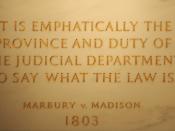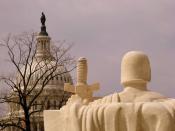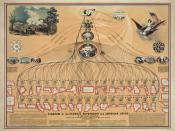What does the word union mean to you? My thoughts wonder to workers, disgruntled employees, and strikes. What if you read the word union with others such as order, justice, tranquility, welfare, blessing of liberty and posterity? These words are the roots of the Constitution that not only inspire patriotism but also a guideline for a balanced government. Our forefathers wanted a central government that was strong enough to run the United States but not absolute. They separated the government into three branches of equal power with no one branch able to supercede the others. But did they succeed?
The President is the key player of the executive branch. The president has the power to serve as head administrator of the nation. Vague in nature, this duty has been interpreted to mean that the president could oversee various programs, agencies, department, etc. He is the commander and chief of all military branches but can't declare war without a Congressional Declaration.
Of course, presidents have used their executive power to send troops where they chose without consent from Congress. The President also has the power to convene congress for important occasions but he does not have the power to adjourn congress. He can appoint his cabinet and various other officials; some require the Senate approval. He can make treaties with foreign countries with a two-thirds Senate vote. He can also grant pardons except in cases of impeachment. The president also has the power to veto meaning disapprove a bill by Congress of course they can still pass it with a two-third vote. Another type of veto the President can use is the pocket veto, with this veto the president may choose not to sign a bill within a ten-day time frame. Unfortunately, if Congress is in session, after the ten days...



Whos the Boss?
This essay about the 3 branches of the U.S. Government and the writers opinion which has the most power. Powers for each branch is listed in some detail and can sway the reader to have a difference of opinion than the writer.
3 out of 3 people found this comment useful.